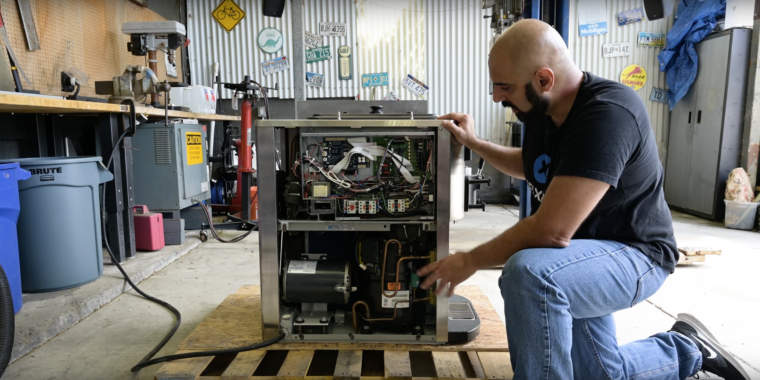McDonald’s soft-serve ice cream machines are regularly broken, and it’s not just your perception. When repair vendor and advocate iFixit was filming a video about the topic, it checked tracking map McBroken and found that 34 percent of the machines in the state of New York were reported inoperable. As I write this, the nationwide number of broken machines is just above 14 percent.
To improve the nation’s semi-frozen milk fat infrastructure, iFixit has done two things. One, as first reported by 404 Media, is to join with interest group Public Knowledge to petition the Copyright Office for an exemption allowing people to fix commercial equipment, such as McDonald’s ice cream machines and other industrial kitchen equipment, without fear of reprisal under Section 1201 of the DMCA.



There’s a comment at the end of the article explaining that the McDonald’s machines are somewhat unique in having a nightly pasteurization process that allows them to go two weeks between cleanings instead of requiring nightly cleaning like other machines.
Listeria is a risk if ice cream machines are not properly maintained. Recent case linked to ice cream machines: https://www.cnn.com/2023/08/20/us/tacoma-milkshake-listeria-deaths/index.html
Not that there are not clearly other issues at play. Just a couple important pieces of what’s going on that were not covered in the article itself.
And to be clear, they’re mostly down because the nightly boil of the ice cream mixture wasn’t completed due to overfilling the machine making it unable to reach the temp. The service company refuses to let the workers know that and the machine doesn’t volunteer that information.
So if there was a small window with a max fill line this problem would be solved?
In fact, Kytch made an aftermarket add-on to the machines to let the restaurants know what is wrong, without having to call Taylor for service.
McDonald’s corporate came out and said they weren’t allowed to do it, that it was dangerous to do it instead of calling Taylor, that it risked leaking McDonald’s proprietary business information.
In fact, Taylor makes ice cream machines for a number of fast food chains, but McDonald’s explicitly got the crappiest one (not as in “cheap”, but explicitly crappy, as McDonald’s corporate mandated their use).
Now why in the world does Taylor make good machines for other chains, and why in the world were operators not free to buy the better models or even fix the models they are allowed to buy? Taylor’s business results talk up the revenue for their paid repair service, and with the operators having easy access to know how to fix it/avoid the problem themselves, their repair volumes would go down. Evidently they have a particularly interesting business relationship and thus McDonald’s corporate was happy to through franchisees under the bus in service of that relationship.
Nowadays, it seems franchisees are allowed to get machines that actually self-report the problems. Presumably all the bad press around the whole ordeal moved it to the point of really needing to be fixed (also two vendors are allowed now instead of just Taylor)
I am guessing when they allowed Carpigiani machines in 2017, they probably opened up a bunch of other Taylor options.
There’s lots of ways that you could solve the problem. It’s not designed to be solved.
Or just a line stamped into the metal reservoir tub
You could even put an etch mark in the tank if you were the tech to fix the problem after the fact.